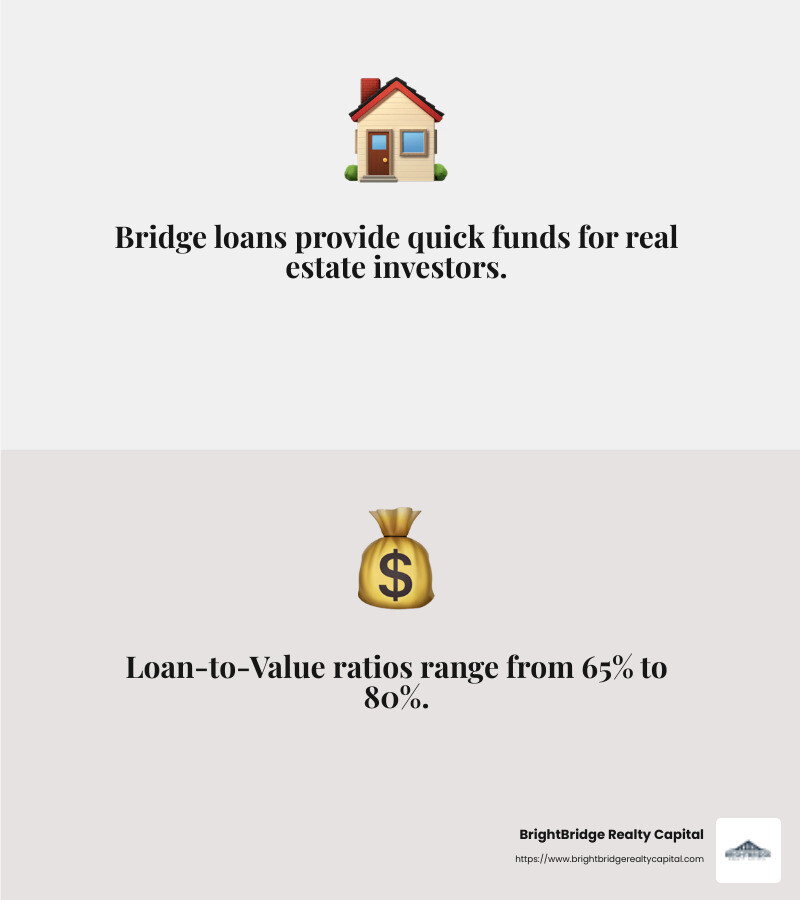Commercial Real Estate Bridge Loans: The Short-Term Solution Explained

What is a bridge loan commercial real estate? It's a short-term loan designed to bridge the gap between securing permanent financing or closing a sale in commercial real estate. This type of financing is ideal for real estate investors who need quick capital to seize immediate opportunities. Unlike traditional loans, bridge loans provide flexible capital, allowing you to act swiftly when that perfect property or deal comes along.
In today's dynamic real estate market, timing is everything. Whether you're looking to jump on a fix-and-flip project, expand your rental portfolio, or secure a great property before someone else does, a bridge loan could be the key. These loans offer a fast and efficient way to get funds, without the lengthy approval processes of conventional mortgages.
With bridge loans, the focus is on flexibility. You can secure financing custom to your needs, with terms that often allow for interest-only payments and no prepayment penalties. This kind of agility can be crucial for investors who understand the value of acting quickly to maximize returns.
While bridge loans come with higher interest rates, their convenience and speed can often outweigh the drawbacks, especially if timed perfectly with your investment strategy.

Find more about what is a bridge loan commercial real estate:
What is a Bridge Loan in Commercial Real Estate?
How Bridge Loans Work
A bridge loan in commercial real estate is a short-term financing solution that helps investors bridge the gap between immediate capital needs and securing more permanent financing. These loans are especially useful for real estate investors who need to move quickly to seize opportunities.
Short-Term Loan: Bridge loans are typically short-term, ranging from 12 to 36 months. Their primary purpose is to provide quick cash flow when time is of the essence.
Gap Financing: Think of bridge loans as a financial bridge. They fill the gap when you need funds now but are waiting for a long-term loan or the sale of a property to go through.
Collateral: Bridge loans are usually secured by collateral, often the property you are purchasing or renovating. This collateral is crucial because it determines the loan amount you're eligible for.
Loan-to-Value Ratio (LTV): This ratio is calculated by dividing the loan amount by the value of your collateral. For instance, if your property is valued at $250,000 and you secure a loan for $200,000, your LTV is 80%. Lenders typically offer loans with LTVs ranging from 65% to 80%.

Loan-to-Cost Ratio (LTC): This is another critical metric for bridge loans, especially in renovation projects. It is calculated by dividing the loan amount by the total cost of the construction or renovation. This ratio helps lenders assess the risk and decide how much capital they are willing to provide.
This type of financing is not just about the numbers. It's about the flexibility and speed they offer. Real estate investors often rely on bridge loans to secure properties quickly, renovate them, and eventually refinance with more favorable long-term loans.
Bridge loans are a strategic tool in the world of real estate. They allow investors to act swiftly and effectively, maximizing their investment potential, even if it comes at the cost of higher interest rates.
Uses of Commercial Bridge Loans
Real Estate Acquisition
In the world of real estate, opportunities can vanish as quickly as they appear. This is where commercial bridge loans come in handy. They provide fast funding, allowing investors to seize immediate opportunities without delay.
Imagine you're eyeing a prime commercial property, but traditional financing is taking too long. A bridge loan can quickly provide the capital needed to secure the purchase, ensuring you don't miss out on the deal. This swift action can be the difference between acquiring a valuable asset and watching it slip away.
Renovation and Repositioning
Bridge loans are not just for buying properties; they are also ideal for renovation projects. When a property needs a facelift or a complete overhaul to increase its value, bridge loans can provide the necessary funds for property stabilization and value improvement.
For instance, if you're renovating an office building to attract higher-paying tenants, a bridge loan can cover the costs of upgrades. Once the renovations are complete and the property's value has increased, you can refinance with a long-term loan at better terms. This strategy not only improves the property's appeal but also boosts your return on investment.
Temporary Working Capital
Businesses often face periods when they need extra cash to keep operations running smoothly. Bridge loans can serve as a lifeline by providing temporary working capital for business operations and acquisition funding.
Consider a scenario where a company is in the middle of an acquisition but needs cash to maintain day-to-day operations. A bridge loan can fill this gap, ensuring the business doesn't miss a beat. Once the acquisition is complete and generates revenue, the loan can be paid off quickly.
In summary, commercial bridge loans are versatile tools that offer fast funding for real estate purchases, renovations, and temporary working capital needs. They enable investors and businesses to act swiftly and strategically, even if it means handling higher interest rates and fees.
Advantages and Disadvantages of Bridge Loans
Advantages
Quick Closing
One of the biggest perks of commercial bridge loans is their speed. In real estate, timing is everything. Bridge loans can close in just days, not weeks or months. This allows investors to act fast and secure deals before someone else does.
Interest-Only Payments
With bridge loans, you often pay only the interest each month. This keeps your costs lower while you focus on improving the property or waiting for a better financing option.
No Prepayment Penalties
Another plus is the flexibility to pay off the loan early without penalties. If you secure long-term financing sooner than expected, you can repay the bridge loan without extra fees. This makes it easier to transition to permanent financing when the time is right.
Disadvantages
Higher Interest Rates
Bridge loans come with a cost. They usually have higher interest rates compared to other loans. This means you'll pay more each month, even with interest-only payments. The higher rates reflect the short-term and quick nature of the loan.
Refinancing Requirement
These loans are short-term, typically lasting 12 to 36 months. You'll need a plan to refinance or pay off the loan before it matures. If you're not ready, you might face a large balloon payment at the end.
Additional Fees
Bridge loans can include fees of up to 2% of the loan amount. While this is negotiable, it's still an extra cost to consider. These fees, combined with higher interest rates, can make bridge loans an expensive option.
In short, bridge loans offer fast funding and flexibility, making them a valuable tool for real estate investors. However, the higher costs and the need for quick refinancing can be challenging. It's crucial to weigh these factors before deciding if a bridge loan is right for your situation.
Frequently Asked Questions about Commercial Bridge Loans
What is the typical duration of a commercial bridge loan?
Commercial bridge loans are designed for the short term. They typically last between 12 to 36 months. This short duration is perfect for those needing quick capital to seize immediate opportunities in real estate. However, it also means that borrowers should have a clear plan to refinance or repay the loan within this timeframe.
How do interest rates compare to other loans?
Bridge loans usually come with higher interest rates than traditional loans. This is because they offer quick access to funds and are considered riskier by lenders. While the rates can vary, they are generally higher due to the short-term nature and the speed at which these loans are processed. Borrowers should be prepared for these higher costs when considering bridge financing.
What are the common eligibility criteria?
When applying for a commercial bridge loan, lenders typically focus on a few key factors:
Collateral Value: The value of the property or asset you're using as collateral is crucial. Lenders assess this to determine how much they're willing to lend you. The loan-to-value ratio plays a significant role here.
Credit Score: While some lenders might be more lenient, a good credit score can improve your chances of approval and might help you secure better terms.
These criteria help lenders evaluate the risk and ensure that borrowers can repay the loan or refinance it within the short term.
Conclusion
At BrightBridge Realty Capital, we understand the unique needs of real estate investors looking for quick and flexible funding solutions. Commercial bridge loans are a powerful tool for those needing to seize immediate opportunities without the delays of traditional financing.
Our customized solutions are designed to fit your specific investment needs. Whether you're acquiring a new property, renovating an existing one, or need temporary working capital, we have you covered. Our expertise in fast closings means you can move forward with your projects without unnecessary delays. In fact, we often close deals within a week, allowing you to focus on what matters most—maximizing your investment returns.
The beauty of working with us is the seamless process we offer. As a direct lender, we eliminate intermediaries, providing competitive rates and a hassle-free experience. This means you get the funding you need quickly, with the flexibility to tailor the loan to your specific requirements.
Explore how BrightBridge Realty Capital can help you make the most of your real estate investments. Learn more about our customized solutions and start your journey today.
With our support, you can bridge the gap to your next big opportunity, ensuring your investment strategy stays on track and ahead of the competition.


